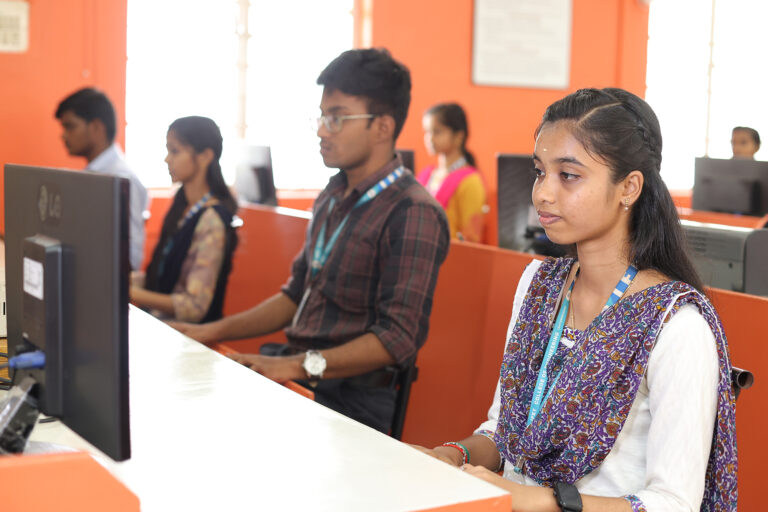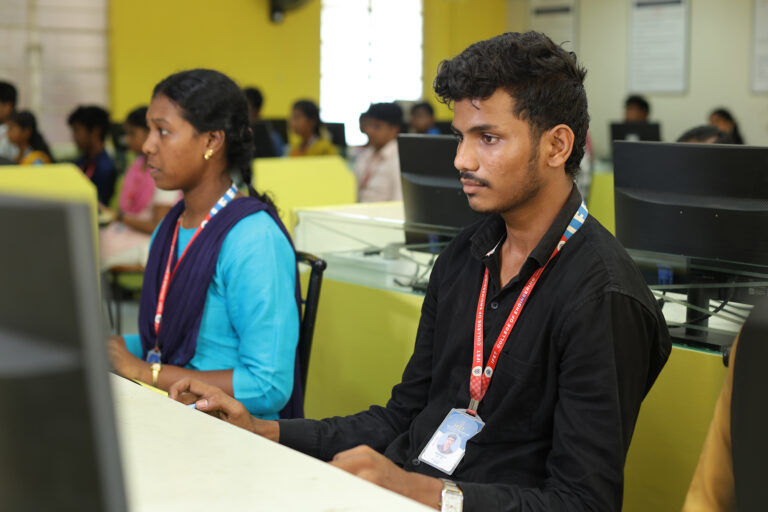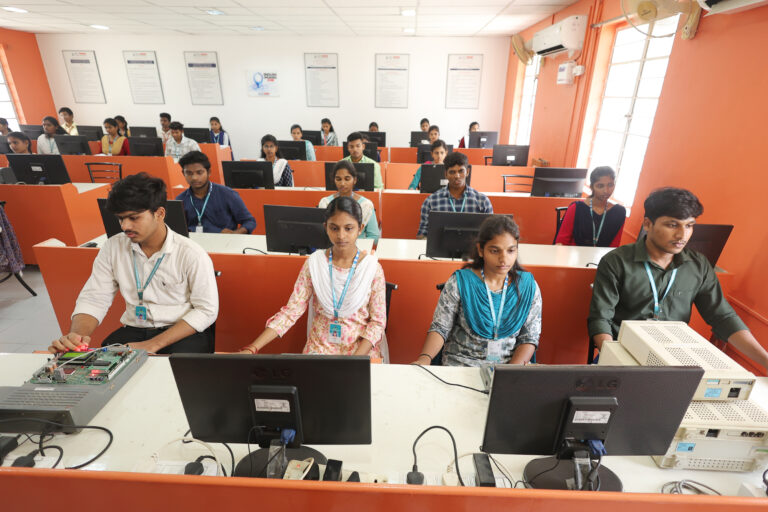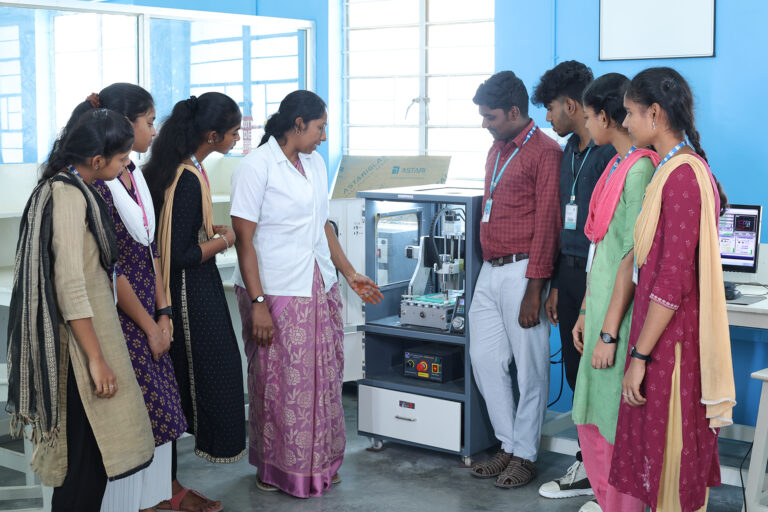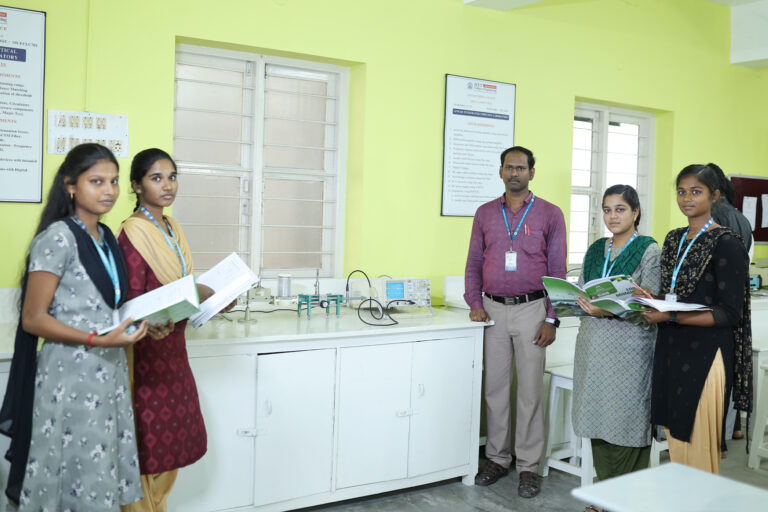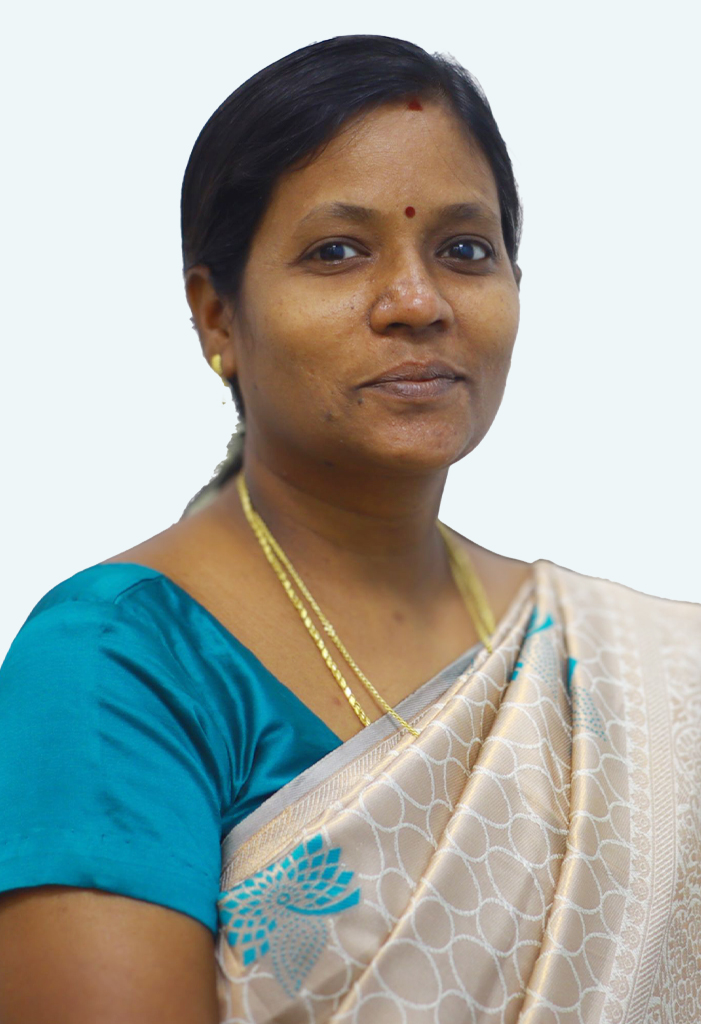
Dr. M. Margarat
HoD (ECE)
The Electronics and Communication Engineering Department, established in 1998, stands as a testament to academic excellence and innovation. Recognized as a research center by Anna University, the department has consistently nurtured a dynamic learning environment. Equipped with state-of-the-art laboratories and cutting-edge technology, it is well-prepared to meet the ever-evolving demands of the curriculum. The department fosters an ecosystem that encourages innovation and practical learning, empowering students to excel in both academia and industry. To enhance student exposure and bridge the gap between industry and academia, the department frequently organizes seminars, workshops, guest lectures, conferences, and training programs in collaboration with AICTE, ISTE, CSIR, ICMR, SERB, Anna University, and leading industries. Activities such as technical seminars, project expos, personality development programs, aptitude tests, group discussions, in-plant training, and industrial visits equip students with the skills and knowledge to thrive in a competitive world. These initiatives ensure that the students are not only job-ready but also poised to become future leaders in the field of Electronics and Communication Engineering.
Department Vision
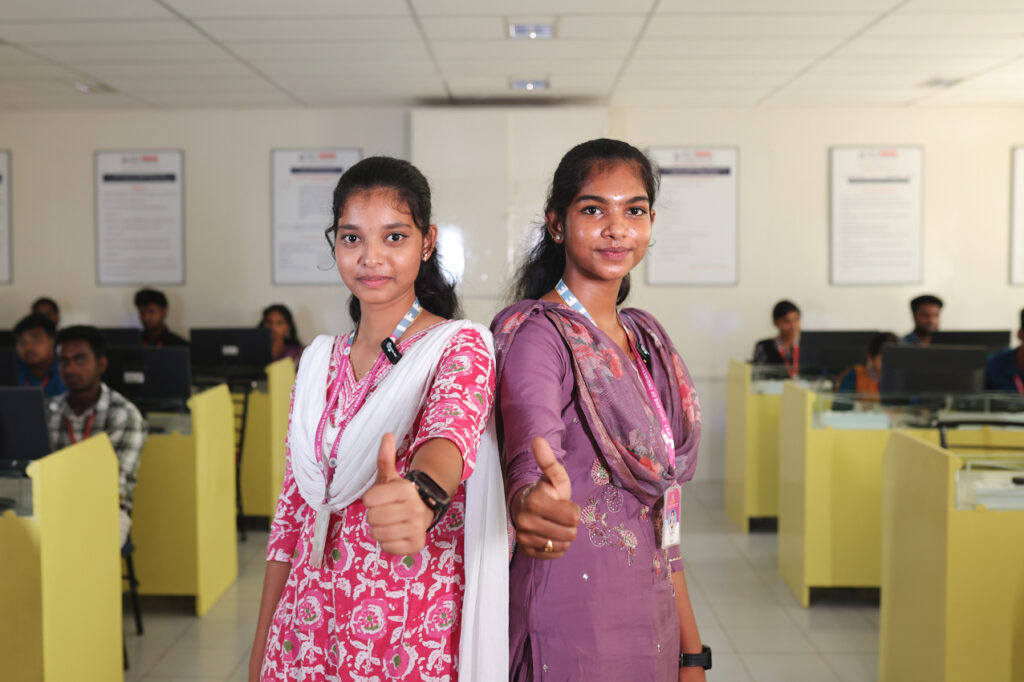
To develop globally competent Electronics and Communication Engineering professionals through quality education, industry collaboration and innovative research upholding the Institute’s pursuit of excellence.
Department Mission
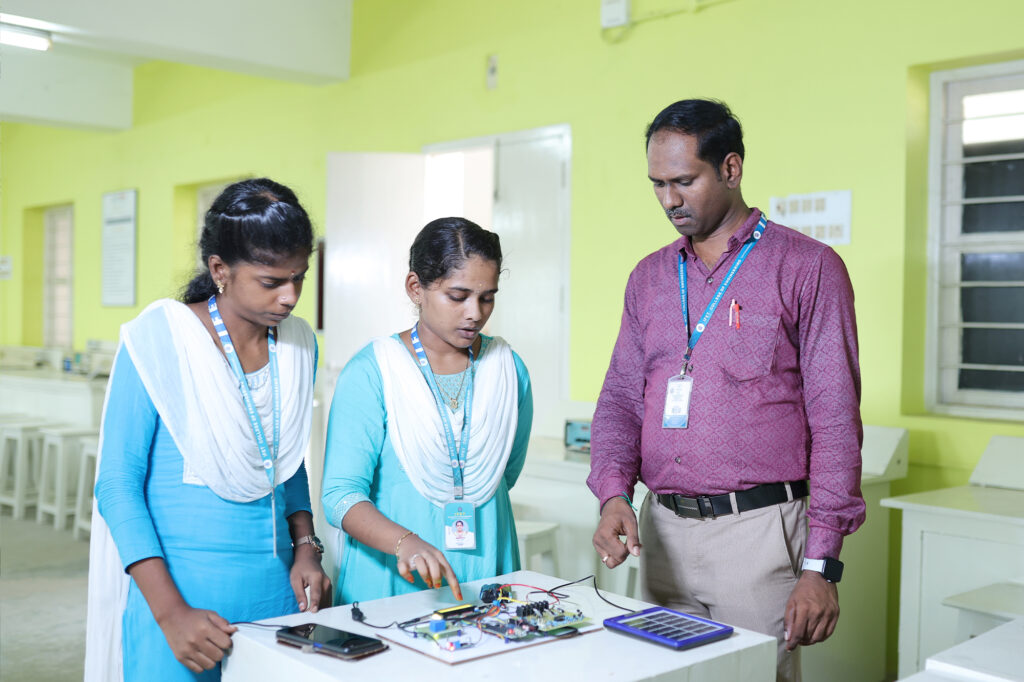
Developing and delivering an exceptional curriculum that ensures practical outcomes and prepares quality professionals.
Ensuring state-of-the art infrastructure to support excellence in education and research.
Equipping students with ethical values and skills necessary for success in a dynamic global environment.
Collaborating with industries to provide students with relevant, real-world experiences.
Driving impactful research with global significance to address contemporary technological challenges.
Fostering innovation, leadership, and entrepreneurship among students to ensure holistic development.
Department Activities
Session Chair
Dr. B. Elizabeth Caroline, Dr. M. Margarat, Dr. J. Vidhya, Dr. S. Jayalakshmi, Dr. D. Prabakaran, and Dr. K. Sagadevan served as Session Chairs for the AICTE-sponsored IEEE International Conference on Smart Technologies and Systems for Next Generation Computing, held on 20th November 2025 at IFET College of Engineering.
05 Jan, 2026
ATAL FDP on Next-Generation Communication
Dr. J. Vidhya participated in the ATAL FDP on “Emerging Trends in Next-Generation Communication: 5G–6G” at M.A.M College of Engineering and Technology from 3rd to 8th November 2025.
05 Jan, 2026
ATAL FDP on AI–IoT–Edge Smart Systems
Dr. A. Devi participated in the ATAL FDP on “AI–IoT–Edge Revolution: Building the Future of Smart Systems” at Manakula Vinayagar Institute of Technology from 17th to 22nd November 2025.
05 Jan, 2026
ATAL FDP on Quantum Computing
Mrs. P. Dharani Devi participated in the ATAL FDP on “Quantum Computing: Foundations, Algorithms and Industry Applications” at Jagan Institute of Management Studies from 17th to 22nd November 2025.
05 Jan, 2026
ATAL FDP on Outcome-Based Education & SDGs
Mrs. Pravina P participated in the ATAL FDP on “From Goals to Outcomes: Designing Education for Measurable SDG Impact” at Teerthanker Mahaveer University from 6th to 11th October 2025.
05 Jan, 2026
ATAL FDP on Intelligent Power Electronics & Cyber-Physical Energy Systems
r. J. Vidhya, Mrs. M. Jayasudha, Mrs. K. Keerthiga, Mrs. M. Narmadha, Mrs. Pravina P, Mrs. Christophel Selvi L, and Mrs. V. Bakyalakshmi participated in the FDP on “Intelligent Power Electronics and Cyber-Physical Energy Systems for a Sustainable Future” held at AICTE IDEA Lab & Vel Tech Rangarajan Dr. Sagunthala R&D Institute of Science and Technology from 17th to 22nd November 2025.
05 Jan, 2026
Program Educational Objectives
PEO 1
Graduates will adapt to modern technologies and apply technical expertise in Electronics and Communication Engineering to address global challenges.
PEO 2
Graduates will pursue lifelong learning, advanced studies and successful careers in Electronics, Communication and allied fields.
PEO 3
Graduates will excel in multidisciplinary projects, demonstrating professionalism, team work, leadership, ethics and effective communication.
Program Outcomes
POs describe what students are expected to know or be able to do by the time of graduation from the program. At the time of their graduation, the B.E. Mechanical Engineering students will have the following abilities.
PO 1. Apply the knowledge of mathematics, science, engineering fundamentals, and an engineering specialization to the solution of complex engineering problems.
PO 2. Identify, formulate, review research literature, and analyze complex engineering problems reaching substantiated conclusions using first principles of mathematics, natural sciences, and engineering sciences.
PO 3. Design solutions for complex engineering problems and design system components or processes that meet the specified needs with appropriate consideration for the public health and safety, and the cultural, societal, and environmental considerations.
PO 4. Use research-based knowledge and research methods including design of experiments, analysis and interpretation of data, and synthesis of the information to provide valid conclusions.
PO 5. Create, select, and apply appropriate techniques, resources, and modern engineering and IT tools including prediction and modeling to complex engineering activities with an understanding of the limitations.
PO 6. Apply reasoning informed by the contextual knowledge to assess societal, health, safety, legal and cultural issues and the consequent responsibilities relevant to the professional engineering practice.
PO 7. Understand the impact of the professional engineering solutions in societal and environmental contexts, and demonstrate the knowledge of, and need for sustainable development.
PO 8. Apply ethical principles and commit to professional ethics and responsibilities and norms of the engineering practice.
PO 9. Function effectively as an individual, and as a member or leader in diverse teams, and in multidisciplinary settings.
PO 10. Communicate effectively on complex engineering activities with the engineering community and with society at large, such as, being able to comprehend and write effective reports and design documentation, make effective presentations, and give and receive clear instructions.
PO 11. Demonstrate knowledge and understanding of the engineering and management principles and apply these to one’s own work, as a member and leader in a team, to manage projects and in multidisciplinary environments.
PO 12. Recognize the need for, and have the preparation and ability to engage in independent and life-long learning in the broadest context of technological change.
Program Specific Outcomes
PSO 1
Students will apply fundamental knowledge of Electronics and Communication Engineering for applications including Signal processing, Communication, Networking, Embedded system and VLSI design.
PSO 2
Students will design and prototype innovative electronic products and apply AI tools to solve challenges in Electronics and Communication Engineering.
PSO 3
Students will be industry-ready with advanced coding skills for software development and technology roles using ICT tools.
Laboratory
The Electronics and Communication Engineering (ECE) Department at IFET College houses state-of-the-art laboratories, including Digital Electronics, Microprocessor, Communication Systems, Networking & DSP, VLSI, and Project labs. These labs provide hands-on training in digital circuits, embedded systems, communication networks, signal processing, and VLSI design, fostering innovation and bridging the gap between theoretical knowledge and practical application. Equipped with advanced tools and software, the labs ensure students are industry-ready with skills aligned to current technological trends.
List of Laboratories:
- Analog and Digital Electronics Laboratory
- Communication Systems Laboratory
- Integrated Electronics and Network Design Laboratory
- Product Development Laboratory
- Project Laboratory
- Research Laboratory
- Advanced Embedded and Signal Processing Laboratory
Innovative Teaching
Click here to view – Summary of Innovations by Faculty in Teaching and Learning
Course Material
Click here to view – Course Materials of ECE Department
Video Link
Click here to view – Video Links of ECE Department
Peer Review
Click here to review – Innovative Teaching Methodologies
Communication Engineers’ Association
The Electronics Professional’s Association is Self-Financed activity for the students of Department of Electronics and Communication Engineering to promote themselves to compete with global levels by conducting Seminars, Project Expo, Guest Lectures and National Level Technical Symposiums in every semester and also various competitions like creative art, e-courage, cross word thinking and adds-up to enrich their knowledge and make them industry ready students. The Association of “COMMUNICATION ENGINEERS” was created for awakening the talents and also for promoting innovative projects.
Faculty List
| S. No. | Faculty Name | Designation | Degree |
|---|---|---|---|
01 | Dr. Elizabeth Caroline B | Professor | Ph.D |
02 | Dr. Palani U | Professor | Ph.D |
03 | Dr. Margarat M | Professor | Ph.D |
04 | Mr. Sagayaselvaraj A | Associate Professor | M.E. |
05 | Dr. Vidhya J | Associate Professor | Ph.D |
06 | Dr. Jayalakshmy S | Associate Professor | Ph.D |
07 | Dr. Prabakaran D | Associate Professor | Ph.D |
08 | Dr. Sagadevan K | Associate Professor | Ph.D |
09 | Dr. Devi A | Associate Professor | Ph.D |
10 | Mrs. Vasanthi D | Associate Professor | M.E. (Ph.D) |
11 | Mr. Jayakumar A | Associate Professor | M.Tech.(Ph.D) |
12 | Mr. Arulpugazhendhi M | Associate Professor | M.E.(Ph.D) |
13 | Mrs. Dharanidevi P | Associate Professor | M.E (Ph.D) |
14 | Mrs. Sivasakthi T | Associate Professor | M.Tech (Ph.D) |
15 | Mrs. Kalpana S | Associate Professor | M.Tech (Ph.D) |
16 | Mrs. Premalatha G | Senior Assistant Professor | M.E (Ph.D) |
17 | Mrs. Dhivya K | Senior Assistant Professor | M.E (Ph.D) |
18 | Mrs. Jayasudha M | Assistant Professor | M.Tech (Ph.D) |
19 | Mrs. Shalini S | Assistant Professor | M.E. |
20 | Ms. Narmadha M | Assistant Professor | M.E. |
21 | Mrs. Keerthiga K | Assistant Professor | M.Tech (Ph.D) |
22 | Ms. Pravina P | Assistant Professor | M.Tech. |
23 | Mrs. Saranya S | Assistant Professor | M.E. |
24 | Mrs. Chiristophel Selvi L | Assistant Professor | M.E. |
25 | Mrs. Bakkiyalakshmi V | Assistant Professor | M.E. |
Academic Year Wise Faculty List
Click here to view – Faculty List Academic Year Wise.

